Nelson Lakes & St Arnaud
St Arnaud lies at the gateway to the Nelson Lakes National Park, one of New Zealand’s most scenic and picturesque spots and a popular holiday destination.
The village of St. Arnaud is situated 700 metres above sea level, encircled by snow-capped mountain ranges and nestled in native beech forest. Just one hour (85kms) from Nelson, one & a quarter miles from Blenheim (100kms) and 35 mins (40kms) from Murchison, St. Arnaud sits at the gateway to Nelson Lakes National Park. There is an array of adventure and leisure activities from fly fishing to alpine & lake hikes and walks for all levels of fitness.
In the early 1990s the Dept. of Conservation started up the ‘Mainland Island’ Nature Recovery Project. With diligent trapping of predators such as rats, possums, weasels & ferrets, the native bird life has sprung back to numbers not seen in the area for decades. Tuis, bellbirds, South Island robins, and Kakas all create a wonderful backdrop of birdsong to stunning Lake Rotoiti and surrounding forest. Summer in St. Arnaud is host to holiday makers, with DOC campsites down at the lake edge, boating on Lake Rotoiti and serious trampers who are spoilt for choice with hikes up local Mt. Robert, along the St. Arnaud Range or over the Sabine/Travers Saddles to Lake Rotoroa and beyond. The Rainbow Ski Field (just a 20 minute drive from St. Arnaud) is open in the winter for the ski-bunnies and when it gets really cold St. Arnaud villagers get out for a spot of ice-skating down at their local natural ice skating rink.
World class, pristine fly-fishing rivers are also found within this region, with the mighty Buller River beginning its journey to The West Coast from Lake Rotoiti. The Buller, with its energetic headwaters, is one of the South Island’s biggest river systems with many tributaries offering superb brown trout fishing opportunities. From the mountains to the sea, the attractions of Nelson, Blenheim and the West Coast are all accessible, and St. Arnaud makes an ideal base to explore and experience this unique region.


